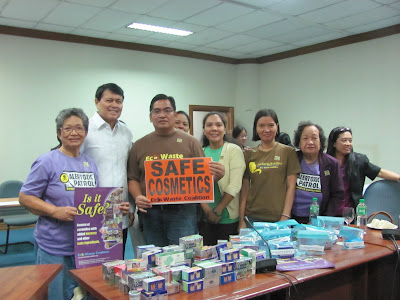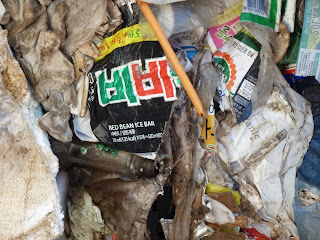EcoWaste Coalition Goes to Senate to Push for Safe Cosmetics Act


 (Photos by Thony Dizon)
(Photos by Thony Dizon)The EcoWaste Coalition, a toxic watchdog, today trooped to the Senate to press lawmakers to enact a “comprehensive and robust” legislation toward toxic-free cosmetics.
At a public hearing convened by the Senate Committees on Trade and Commerce and on Health and Demography, the group reiterated to the senators led by committee chairs Sen. Manny Villar and Sen. Pia Cayetano about the urgency of enacting a “Safe Cosmetics Act.”
To emphasize the recurring problem with cosmetics containing hazardous chemicals, Aileen Lucero, Safe Cosmetics Campaigner of the EcoWaste Coalition, presented before the senators the results of the tests the group conducted on skin whitening products.
Using X-Ray Fluorescence (XRF) analyzer, a device that is routinely used by US regulatory agencies, the EcoWaste Coalition, in collaboration with US-based International POPs Elimination Network (IPEN), detected mercury in 11 out of 12 skin lightening creams purchased from Quiapo retailers.
The tests conducted by visiting IPEN scientist Dr. Joe DiGangi detected elevated quantities of mercury, ranging from 1,085 to 28,600 parts per million (ppm), far above the national regulatory limit of 1 ppm for mercury in cosmetics as defined by the Food and Drug Administration (FDA).
Citing information from the United Nations Environment Programme, Lucero pointed out that “mercury use in cosmetic products can have adverse effects, including skin rashes, discoloring and scarring, and can reduce skin’s resistance to bacterial and mycotic disorders.”
UNEP has warned that “direct and prolonged exposure through the skin during repeated applications can cause damage to the brain, nervous system and kidneys.”
“Our chemical analyses, as well as those conducted by the FDA that led to successive product recalls in 2010, justify the enactment of a comprehensive and robust law that will proactively protect consumers, especially women and girls, from mercury and other chemicals of concern in cosmetics,” she explained.
“Cosmetics that conceal essential product information such as their chemical ingredients and their associated risks should not be sold in the market. They should be first proven safe and beneficial before being traded and sold. Otherwise, consumers become unwilling guinea pigs,” she pointed out.
“The duty of proving that their products are safe and beneficial rests with cosmetic manufacturers who, in the first place, generate profits from their sale,” she added.
The group expressed support to Senate Bill 1886 filed by Sen. Miriam Defensor-Santiago that will require cosmetic products sold in the country to be “free of any ingredients which have been identified as chemicals causing cancer or reproductive toxicity”.
The group also welcomed Senate Bill 943 filed by Sen. Lito Lapid, which if enacted, will prohibit the use of phthalates, a group of industrial chemicals recognized as endocrine disruptors, in personal care products.
However, the EcoWaste Coalition seeks a stronger and holistic legislation that will, among others:
1. Prohibit the presence of toxic chemicals in personal care products, especially substances that are categorized as known or probable human carcinogens, reproductive toxins, endocrine disruptors or mutagens.
2. Require manufacturers, importers, distributors and retailers to disclose all chemical ingredients of their products in keeping with the consumer “right to know”, and deny market access for products not disclosing full product information, including potential health and environmental effects.
3. Set health-based safety standards on chemicals in personal care products in line with the precautionary principle, which states that “when we have a reasonable suspicion of harm, and scientific uncertainty about cause and effect, then we have a duty to take action to prevent harm.”
At the hearing, the EcoWaste Coalition also emphasized the need to ensure full budgetary support for FDA to enable the agency to effectively perform its expanded regulatory functions under the Food and Drug Administration Act of 2009.
“With adequate resources at its disposal, including basic analytical equipment such as XRF, we can expect the FDA to make waves in the performance of its most essential regulatory functions,” the EcoWaste Coalition said.
-end-




Comments